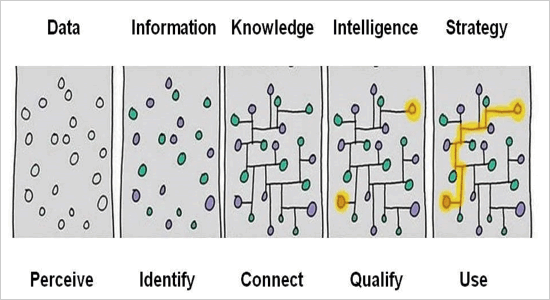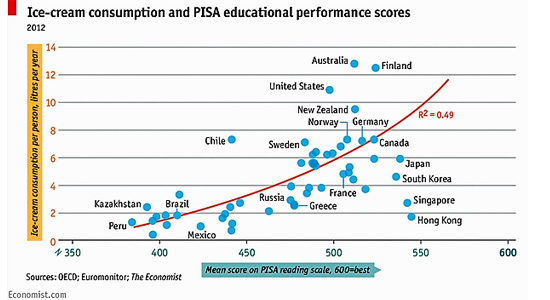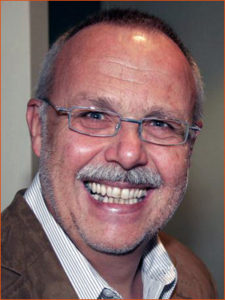Im Zeitalter der Fake News: Informationen immer wieder neu qualifizieren
Man glaubt nicht, dass das jemand glaubt

Fake News – so alt wie die Medienkommunikation
„The Weekly World News“, Lantana (FL) zählte ein paar Tausend Leser. Die Titelgeschichte entsprach deren Wahnvorstellungen bezüglich des linksliberalen Feindbildes. Die Publikation vom Juni 1993 illustriert, dass das Phänomen „Fake News“ keinesfalls neu ist – vgl. unten die Beispiele aus der Zeit des römischen Kaisers Nero – und kein Ausfluss der Verbreitung sozialer Medien, sondern schon immer Medienalltag war. Heutzutage haben derartige Wahn- und Verschwörungsvorstellungen allerdings 100 Millionen v.a. in den USA ergriffen.
Fake News als Instrument des populistischen Machtstrebens und des Machterhalts der kapitalistischen Eliten
„Fake“ hat ein äusserst breites Spektrum von zwar konditionierter aber allenfalls unfreiwilliger Unbedarftheit bis zu subtilster Wahrnehmungsmanipulation. Innerhalb dieser Spannweite fokussiert information-intelligence.ch in erster Linie wirtschaftspolitisch ausgerichtete Tatsachenverdrehungen und statistische Manipulationen – allenfalls tiefsitzende Irrtümer und Bias. Das Fatale an gezielt verbreiteten Fake News ist deren Zweckbestimmung: Nämlich die Beeinflussung der Fake Newskonsumentinnen hinsichtlich deren Zukunftsentscheidungen, seien dies nun politische Willensakte oder gesellschaftlich relevantes Verhalten sowie die Verschleierung von Machtmissbrauch durch Hintermänner der Fake Newsproduktion.
Für „rechtsgerichtete“ populistische Fake News sind Zielgruppen empfänglich, deren Lebenserfahrung oder Milieuprägung dazu führen, dass sie sich insbesondere in ihrer selbst empfundenen Würde verletzt fühlen und deshalb Feindbilder wie „Ausländer“, „Städter“ und „Intellektuelle“ gerne annehmen, wie Russell-Hochschild nachweist. Dabei reicht es aus, Lügen, wie unter Trump und seiner Gefolgschaft, genügend intensiv zu verbreiten, bis nichts mehr geglaubt wird. Hannah Arendt hat dazu gesagt: „With such people, you can do whatever you want“.
Profiteure des Abgleitens weiter Bevölkerungskreise in faschistische, xenophobe Denkmuster sind v.a. die Superreichen und die rechtslibertäre Oberschicht, weil der Volkszorn sich ja nicht an der zunehmenden wirtschaftlichen Ungleichheit entzünden soll, sondern mental – beispielsweise auf Ausländer – umgelenkt wird. Lind beschreibt diese Mechanismen in „The New Class War“.
Im politischen Mainstream angekommen
Was 1993 in Florida noch als Frustrations-bedingte Verirrung kleiner Minderheiten mit Bildungsdefiziten und weit unterdurchschnittlichem Einkommen durchging, ist drei Jahrzehnte später politischer Mainstream, v.a. in den USA: Millionen von Trumpanhängerinnen glauben die irrwitzigsten Behauptungen bspw. der republikanischen Abgeordneten Marjorie Greene, Juden hätten Waldbrände mittels Lasern aus dem Weltall in Brand gesetzt.
Damit wird mittelalterlich anmutende Progromstimmung verbreitet, in welcher beispielsweise der Abgeordnete Paul Gosar in einem webpublizierten Zeichentrickfilm darstellen kann, wie er die linksliberale Abgeordnete Alexandra Ocasio-Cortez tötet. Gosar gehört derzeit zur Gruppe der wahlkampfstärksten Einsammler von Spendengeldern. In der Schweiz beschränken sich die Verschwörungstheorien beispielsweise zu Corona und zu Impfungen auch nicht mehr auf ein paar Verirrte zuhinterst im Muotathal, sondern sind in Parlamentsdiskussionen zur diesbezüglichen Gesetzgebung angekommen.
The Medium is not the Message
Fake News als unvermeidbare Folge der Webdurchdringung und der Social Media zu qualifizieren, ist Verharmlosung: Vielmehr ermöglichen die Social Media, noch so absurde Positionen mit raffinierterer Subtilität in grösserer Breite und Tiefe zu verankern als je. (Social) Medienmacht ist damit ein Brandbeschleuniger für das Abfackeln von Demokratie, Menschenrechten, Ethik und Moral – unsere Zivilisationsgrundlagen, nicht jedoch die Ursache. Diese liegt in der Strategie der Superreichen, ihren Machtanspruch zu verschleiern.
Daten im Zeitalter der Fake News
Auf dem Hintergrund von drei Jahrzehnten Berufstätigkeit in der Markt- und Medienforschung, bedeutet Information Intelligence, Anregung dafür zu bieten, wie Daten zuverlässig (Reliabilität), im Hinblick auf ihre Richtigkeit (Validität) qualifiziert und allgemeingültig (Repräsentativität) interpretiert werden können. Dazu gehört auch, zu analysieren, welche Machtstrukturen welche Informationsinhalte und -Formen resp. deren Akzeptanz prägen. Dies zu erkennen, bildet Grundlage zu nachhaltigem gesellschaftlichen Agieren – das politische Anliegen dieses Blogs.
„Information intelligence requires experience, creativity, openness of mind and attention to detail.“ (Michael Mancha)

Im Hinblick auf den intelligenten Umgang mit Daten kommt es auf Folgendes an:
- Daten vorurteilslos wahrnehmen, ist keine Frage der Sinnesorgane oder technischen Hilfsmittel, sondern eine Frage der mentalen Konditionierung: Neugier, Offenheit, Qualitätskompetenz, Kreativität in der Interpretation, Handlungsmotivation.
- Daten werden zu Informationen, wenn sie im historischen, aktuellen oder zukünftigen Kontext identifiziert und eingeordnet sind und
- derart in Bezug zu einander gebracht werden, dass höherwertiges, neues Wissen entsteht.
- Wenn Informationen im Hinblick auf spezifische Situationen qualifiziert sind, können daraus Erkenntnisse abgeleitet werden,
- welche strategische Optionen bieten.
Abnahme der Datenqualität
Im Zentrum meines Berufslebens stand früher – und steht in der hergebrachten Umfrageforschung immer noch – das Schöpfen von (vermeintlich) neuen Informationen. Die immense Datenvervielfachung im Web suggeriert dabei eine Zunahme von Informationsbreite und -Tiefe , obschon die Theorie des abnehmenden Grenznutzens dies längst falsifiziert hat.
Die Erfahrung aus Tausenden von Feedbackprojekten zeigt, dass Bias (Verzerrungen) in der Datenerhebung und -Interpretation nicht selten unwissentlich in Kauf genommen, schlimmstenfalls toleriert aber oft bewusst herbeigeführt werden. Datenproduktion und/ oder -Verbreitung sind damit immer wie stärker bewusst oder unbewusst durch eingebrachte Macht- und Interessenbindung geprägt.
Insgesamt nehmen Erkenntnisnutzen (Validität) und Verlässlichkeit (Reliabilität und Repräsentativität) von Daten damit kontinuierlich ab. Dies alles in der Erkenntnis, dass seit der Evolution des Homo Sapiens, der Umgang mit Informationen neurologisch, also weitestgehend durch das Unterbewusstsein, gesteuert ist.
Wir sehen die Dinge nicht, wie sie sind, wir sehen sie so, wie wir sind. (Anais Nin)
In der Optik, dass es ohne Feedback selbst qualifizierten Informationen an Objektivität und Aussagekraft mangelt, ist das Führen eines Blogs besonders attraktiv. Nicht validierte Informationen laufen Gefahr, als Fake News zu enden:


Korrelation und Kausalität


Aufregend wird es, wenn korrelierende gesellschaftliche Phänome wie beispielsweise wachsende Staatsausgaben und Wachstum in eine Ursache-/ Wirkungsbeziehung gesetzt werden. Sowohl die positive wie auch die negative Korrelation werden wissenschaftlich verargumentiert: Z. Bsp. Sinkende Staatsausgaben als Quelle des Wachstums resp das Gegenteil. Korrelation und Kausalität entscheiden also über fake und nicht-fake.
Why this blog? Summary with the twinkle of an eye

Since we tend to perceive things not as they are but as we are it is indispensable to boost information intelligence with feedback from others. Thus any comments and contributions are most welcome – particularly related to:
- Fake News, such as Nero trumping to be the world’s greatest artist as he bought or coerced applause – fake in two ways as also the attribution to nero’s last words is historically incorrect.
- Real news believed to be fake, such as Hitler denouncing the invasion of Normandy as a ruse before it was too late .
- Confusion of reason and effect, particularly when both chains may be applicable depending on the circumstances: Are the US a great nation because of migration or do people migrate to the US because it is a great nation?
- Confusion regarding correlation and causality
Why this blog and why this content
Democracy and the market economy
The dynamics and the stability of societies depend on transparency and fairness regarding access to resources and opportunities. In this context it is crucial how society handles the ressource „information“:
- Are producers and consumers of information aware and enabled?
- Is there a framework of rules and morale preventing abuse of information?
The power of openness
The contributions in this blog center on political and/ or economic imperfections particularly due to insufficient information intelligence respectively the diffusion of willingly fake news.
New nationalism, a mercantile look at the economy and market imperfections due to state and large company’s or sector monopolies restrain development and foster inequality more than truly open markets should. This blog is commenting these and other fatal developments in western societies in the perspective of how information is handled.
Local and global perspective
The view of this blog is both national – particularly Swiss – and global: Switzerland being one of the most global countries where the power of development is particularly rooted in the flows of people and their mindsets and concepts of life through its valleys and across its mountains. On top of it the growing inequality regarding assets drives a frustrated middle class increasingly into the arms of populists.
Politik und Wirtschaft als Themen
Die Welt ist imperfekt. Nicht jeder erreicht, was seinem Potenzial entspricht und einige erreichen zu Unrecht, was ihnen nicht zusteht. Humanismus, Demokratie, Moral und Nachhaltigkeit stellen sich in einer liberalen Wettbewerbsgesellschaft nicht automatisch ein. Vielmehr haben historische Entwicklungen, namentlich die Ungleichheit der Verteilung von Kapitalgütern und von Macht seit Urzeiten die Evolution geprägt.
Ziel des Blogs ist, „Imperfektes“ in diesem Kontext aus der Perspektive des Umgangs mit Informationen aufzudecken. Dies auf dem Hintergrund einer gewissen Altersweisheit (s. dazu meine Aphorismensammlung unten), welche erkennt, dass die meisten unserer Wahrnehmungs- und Verhaltensmuster innerhalb unsereres sozialen Umfeldes weitestgehend fixiert und damit praktisch unveränderlich sind.
Better Szenarios with qualified information
As a reality test I will publish szenarios in view of qualified information with a percentage probability:
(Italics: Published November 2022)
Trump to be president 2024: 65%
- In the 7 swing states Arizona, Georgia, Michigan, Nevada, North Carolina, Pennsylvania and Wisconsin a few counties with alltogether maybe less than 50’000 undecided voters will make the difference. In surveys Trump and Harris are within the error margins – not only on the statistical level but also due to the imprecions of the relevant small scale surveys. The intentions to vote and their survey response rates are not known. Thus there is no statistical probability for either one of the candidates.
And so the swing states fell for Trump! After the election a Florida citizen was quoted: „The whites would not vote for a non white, latinos and other colored males would not vote for a women“. This reflects the ethnic/ cultural barriers not overcome by the American society and ruthlessly fostered by the populist right. No survey, however, would ever show this. In the end, however, fascists at heart tired of democracy and eager for a „strong man“ may have voted for Trump out of conviction, others out of frustration about their lacking social mobility (according to Protzer, „Social Mobility Explains Populism, Not Inequality or Culture“).Many more voted for Trump because they resented Harris and the political class which she represents, a ruling class which for years has staged a political theatre called „democracy“ as Danile Strasberg explains in „Republik“ Dec. 17th 2024 . In the end a majority of spectators – never in a situation to become actors – opted for Trump’s show which promised a more attractive spectacle. Finally Trump collected the votes of the rich, eager for lower taxes and less regulation – with 5 to 10% of the population not a truly signifcant number, but relevant in turning smaller neighbourhoods in the rich suburbs from blue to red.Harris, however, was unable to mobilize the less well off, younger people or women as many of them are convinced that Trump will better their economic situation by expelling immigrants and creating well paid jobs with protectionist measures. Paul Krugman explained it in the simple term coined by Bill Clinton „it’s the economy, stupid“: A majority of the population experiences frustrations with every purchase they make – most posssibly several times per day – as they realize the rising prices of everything. As Krugman puts it, inflation is always blamed on the existing government, the producers or the store keepers – it is „them“ that charge higher prices, thus obviously making higher profits. And it’s „us“ that pay the bill- not considering the pay rises or the corona money showered onto them. No connection is made between higher prices and their compensation with higher salaries: One makes more because one deserves it. So in the end – as Elisabeth Bronfen described it – „the unhappy think they will do better with Trump whereas the very happy think with Trump they will certainly not fare worse“. No candidate of the establishment could have countered that. - For further speculation we assume for the relevant swing states counties to be somewhat similar to the population average. The number of people with psychographic properties typical for Trump followers has a share of ca 55% of the population. The radicalisation will increase their motivation to go out and vote. This radicalisation is due to the disrespect of the left liberal elite towards the social and economic setback of the 2nd and 3rd income quintiles („lower middle class“) . Even though complex irrational propensities to vote for Trump are relevant there is an important highliy visible rational reason not to vote for the actual government respecitvely their actual candidate Kamala Harris: The Corona money showered onto the less well to do is gone and the memories short lived. The price of an egg 2020 as compared to today is, however, visible to everybody. Even african american and latino voters believe that Trump’s tariffs and the expulsion of illegal immigrants will change this.
- The number of people inclined not to vote for Trump decreases, also due to the restrictive voting rules and procedures inacted in states governed by Republicans. Worse however: Democrats are loosing support among their core voters like African Americans, Latinos and blue collar workers. These sociologically explained factors are somewhat upset because of Kamela Harris‘ appeal to women.
- In the end the share of the population inclined to vote for trump out of frustration is bigger than the group in favour of Harris as a means to keep their privileges. Nobody can predict where the motivation to vote is bigger.
- The disproportional weight of smaller states enables Trump to win with just over 40% of the popular vote.
As of now, Nov. 6th 2024, we know that the election of Trump – together with other desasterous developments such as Putin’s war against Ukraine, the growing agressivenes of Xi Jinping, the rise of fascism all over the world, the collapse of the ecology – marks the end of a „golden period“ of democracy (which may have been part of the show, however with widening discrepancy to the reality), stability, prosperity and rule of law – at least in the so called western world.
Constantin Seibt writes in „Republik“ Nov. 2nd 2024 (sharing my own prediction) that „history teaches that whimsicality and lawlessness are the rule and democracy the exotic exception“. (Geschichtlich waren Willkür und Rechtlosigkeit die Regel und die Demokratie die exotische Ausnahme.) These shifts appear to ocurr in time frames of 800 („dark centuries“) to 80 (golden ages) years. The latter encompasses typically 3 generations: One generation to gain a golden era (the soldiers of WW 2 did), one to enjoy it (our parents did) and one to gamble it away (the baby boomers do).
Trump as a potential dictator may stretch his presidency to the length of his life followed by rulers with the same dark intentions. Unlike 2016 when I found consolation in Trump’s short lived 4 years presidency I now expect the irreversibility of the beginning of a new dark age: In the short term we will see an economic downturn – first in the US, later world wide – in the wake of deglobalization (Trump: „I am the taxman“) and growing xenophobia (Trump: „Kick them out“).
The growing xenophobia will keep MAGA representatives and Trump – or his successors – in place. This due to zero sum thinking (elaborated by Stefanie Stancheva in „Economist“, July 12th 2025) of a majority of voters. The model goes as follows: Growing inequality and an economic downturn will imply with a growing part of the population that migrants and other groups benefiting from governement support (e.g. women, people of color, etc.) or growth in markets like high tech or finances are getting larger pieces of a shrinking pie at the expense of a growing majority of the population without these benefits. The larger the number of real, but even more so convinced victims the bigger the share of vote for those fueling these beliefs.
Later on we will face social unrest due to excessive inequality. This might push countries deeper into fascism. In medium terms we will see ecological disasters (Trump: „I can only say drill, drill, drill“). In the long term artificial intelligence manipulated by the rulers will dominate human minds.
This bleak outlook will neither be reversed in the congressional elections of 2026 nor presidential elections 2028: Before anything changes, things would have to become much worse. An economic downturn and growing inequality will only make it easier to radicalize the Trump constituency – even without Trump
Europe to fall under Russian influence within a few years: 65%
- As support from Western countries starts to diminish with the US as main support falling away, Russia is able to continue at least hybrid wars extending into all of Europe for decades on the basis of the imports from friendly states and exports of raw materials and fuel into these markets. Trump will destroy Nato, stop the aid for Ukraine and – without the Nato atomic umbrella – leave Europe open to Russia’s atomic extortion. Peter Sloterdijk correctly reminds us that sovereignty is lost when the ability for credible threats is lost – this will be the case when Europe loses the atomic umbrella. Even with a complete failure of all major economic and social structures Russia will stay a geopolitical power as the North Corean example shows. Europe will see some „München“-moments with the illusion to satisfy Putin’s appetite.
- The West will tolerate these developments all the more because Russia as an economic partner appears negligible (it has only a tenth of the European economic and technical power and also lost its importance as an energy supplier) and also militarily appears to be no serious threat for Europe. The population in western countries resents further expenses for resistance against Putin’s aggressions, even more though for massive across the board armement. Only the most reckless want to be soldiers – particularly outside their own country. This even more so because fascist views – at least tolerance of it – already enable a fascist governments in the US, Hungary, Slovakia and Italy soon to be followed by the Czech Republic, Austria and Croatia, most possibly also by Romania and Bulgariain in the context of their criminal connections to Russia, as well as France after Marie Le Pen will take over the French government in 2027.
- Russian hegemony, particularly in South Eastern Europe will be enabled by the super rich respectively organized crime as their social model reflects Russian totalitarism.
- Controlling the food supplies also in the Ukraine, Russia will take large parts of Africa into its sphere of influence whereas Asia and South America will be dominated by China.
Bildquellen:
- Prozess: Avinash Kaushik
- Nero: Listverse
- Normandy: Getty Images
- Liberty: Foter
- Career: Garry Larson, Pinterest
